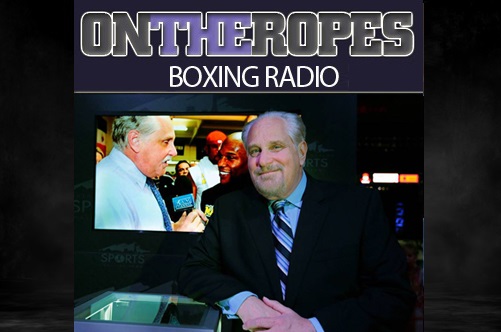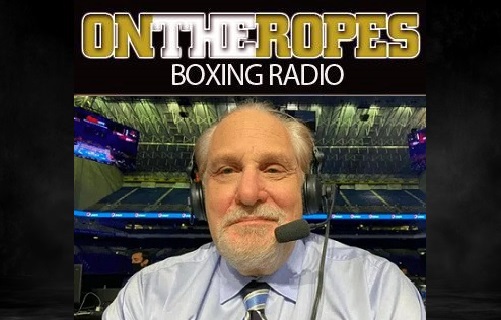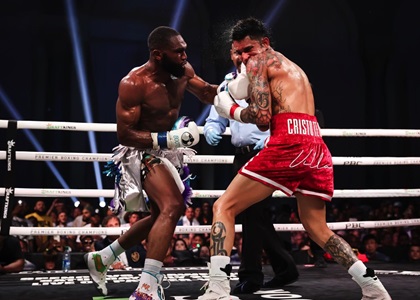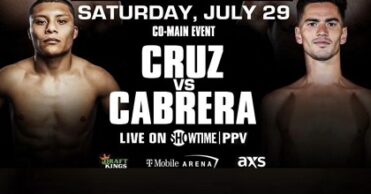With the recent controversial scoring of the Canelo vs. Golovkin bout from last Saturday night, fans and media alike were once again reminded of one of the biggest flaws from the sport of boxing, questionable judging of bouts that go to decision. In light of Adalaide Byrd’s 118-110 scorecard, many people were also reminded of another judge who had been criticized for her scoring of bouts, C.J Ross.
Ms. Ross has mostly stayed out of the spotlight since her 114-114 score in the Mayweather vs. Canelo bout and has not judged fight since then, but I actually had a chance to speak with C.J Ross in January 2015. In this interview, she shed light on what it is like to be a judge in the sport, talked about the scoring criteria in boxing and discussed her two most controversial scorecards in the Pacquiao-Bradley and Mayweather-Canelo bouts. Here is what C.J Ross had to say.
Robert Brown: Can you explain the judging criteria for people who don’t understand it as well as they should?
C.J. Ross: The whole process for judging takes quite a while to even learn the skills. I’ve been doing it for about twenty two years and before that I spent three or four years with amateur boxing. You learn the basics first and then it can take you anywhere from ten to fifteen years to be able to get into the upper fights, the championships, depending on the need and the area that person is at.
You spend a lot of time going to seminars and learning what’s expected from judging by reviewing films of fights and discussing the rounds, round by round because a judge only judges rounds of boxing. The scores that people hear at the end are an accumulation of rounds scored and I think that’s what’s confusing to most people, they think we decide who wins the fight at the end of the fight and it’s not that way.
You can stop a fight at any time during a round and a judge would have a decision because we keep a running tally in our head at all times, and that requires total concentration to do that. It’s misconstrued on the fans parts because they don’t pay that kind of attention to what’s going on.
It’s not easy and it takes a lot of time and you just have to be dedicated to doing it, to even want to do it. It’s not something where we make any kind of large amounts of money on, with most judges it’s based on our integrity and honesty. We love the sport of boxing but we’re not necessarily fans of boxers. We like to see fairness, no matter who wins or who the favorite person is to the fans, we just want it to be fair.
Robert Brown: How often are people’s criticisms of certain fights warranted by the public and how much of it is lack of understanding of judging and judging criteria?
C.J. Ross: I think that when you’re watching a fight and you’re watching it televised, you’re not seeing the fight as a judge sees the fight. Judges sit on three different locations around the ring and each judge may see a different thing. One fighter might be stronger in that direction, he may direct his punches where you can see them from that side of the ring, whereas a judge from the opposite side has the punches blocked from his or her view and that judge will have a different score.
On TV you’re seeing only the camera view and listening to only the people that are doing the commentating and their point of view, so you’re not really seeing a judge’s view. It might be a better idea to put cameras on all sides of the ring, or put judges all on one spot and let us discuss each round and then come up with a score.
When we’re there at different fights, I don’t have any clue what the other two judges are doing until I hear the scores announced at the end because it’s all based on what I saw and their scores are based on what each of them thought. When you come out with even scores at the end of the fight, the cards themselves aren’t gonna look that way because they may have had three rounds one way and one round another, all through the fight.
You have to look at the twelve rounds accumulated. Rarely there’s a fight where all three judges agree on each round because we’re sitting on different sides of the ring and you can’t count what you can’t see. From day one of training you’re taught not to count it if you didn’t see it, even if the people scream and you think, “Well he probably landed,” you can’t count it, you let the other two judges count it because maybe they saw it.
Robert Brown: Would it help judges if they had access to video replay or would that distract you away from your job too much?
C.J. Ross: As long as I can be right at the right where I’m able to touch the ring like I am now. I’m able to put the score sheet and everything in front of me and I’m physically at the ring. The more that you get space in between the judge and the fighters, the less that you’re gonna be able to see because of legs and feet and referees and camera people. It could be a distraction if you back them away from the ring, but as long as we’re all at the ring, it should be okay.
Robert Brown: I’d like to talk about the first Manny Pacquiao vs. Tim Bradley fight. You and Duane Ford gave the fight to Bradley and most of the public gave the fight to Pacquiao. Looking back at that fight, are you still happy with that decision and do you think there wouldn’t have been as much controversy if it wasn’t a Pacquiao fight?
C.J. Ross: No I don’t think the fighters made any difference. There are differences and people don’t understand how we judge. That was a very close fight and Pacquiao had it going into the last two rounds and all three of us judges in our discussion afterwards stated that it looked like Pacquiao had taken the last two rounds off, like somebody told him, “You got this, you don’t have to stretch it anymore.” That’s what it looked like to people at ringside.
People pick fans ahead of time, just like any other team sport, they have fans. Pacquiao has a lot of fans all over the world, so when your team loses or your fighter loses, you’re gonna find something wrong with the judging, the officiating, something because it went against your thought. That was a very close fight with close rounds.
You can have a fight with individual close rounds and people can see it one way or another, so they get the wrong numbers in their head if they’re fans and they’re being distracted. The judges, we all saw it as very close, very close rounds with Pacquiao dominating early and then switching back and forth, one round one way, one round the other way. It was those last few rounds, had he kept that energy or the desire in the last two rounds, he probably would have taken that. I don’t know why he backed off.
It’s been a while since I’ve watched it but I know when the commission reviewed it with us, that all three of us pretty much agreed. I know that I was the only judge out of the three judges that had agreed with at least one of the other judges on all twelve of the rounds.
To a judge, that’s all you can hope to be, to be in agreement or be in the majority for twelve out of twelve rounds. That was one of the reasons I was put on the Mayweather fight, because of my ability to score and to be able to be on the majority on individual rounds.
The crowd and the fans, they don’t hear anything about judges majority for individual rounds, they only hear the end score. If you can get the score sheet and read individual rounds and look at rounds again and really evaluate, you can see why the end up like they do.
Robert Brown: Judging is very subjective, do we need to define the judging criteria more clearly or are you happy with the current criteria at the moment?
C.J. Ross: I think the criteria of judging is fine and I think that the difference you get between commentator’s abilities to judge and the real judges, I think there needs to be some better training on the TV side of things.
I know personally where some of those people are sitting and I’ve observed them when I haven’t been doing a fight and they don’t pay as much attention as the judges do. They’re distracted by their headset and getting orders through their headsets, “We’re going to break, we’re doing this.” I’d say the commentators are distracted, judges are not distracted.
Robert Brown: When commentators criticize judging without understanding the full criteria, does that make things more difficult for judges?
C.J. Ross: No, because we really don’t pay attention to what the commentators say. We know that what they’re doing is trying to stir up controversy to try to make it a show for people. The more they get excited about something and criticize and stir up controversy, the more people write in to them. They try to stimulate that kind of controversy for them, it’s just something TV does.
They are not judges, they really have never been to seminars, it’s just a TV thing. Their job is to create a show and that’s what they try to do but when they start criticizing the judges so often for so much, it gets old I think.
I know a lot of people that have watched fights for years and they turn off the sound now because they don’t like to listen to the commentators. They enjoy watching the fights with their own opinions, instead of listening to the commentators put in their two cents.
Robert Brown: I’d like to get your thoughts on the Mayweather-Canelo fight. You scored that fight a draw and the other two judges had wider margins and after that match you decided to step down from judging. Can you talk to us about that experience?
C.J. Ross: I was asked why my score could have gone to a draw but it just has to be one fighter ending up with six rounds. When you think of it in terms of six rounds and the nearest other judge had an eight round to four card, we weren’t all that far off. It was an even fight, a lot of those rounds were even, they just swung back and forth.
It also depends on what side of the ring you’re on and what you thought from your side of the ring. I know that during that fight, my score reflected what I saw. Maybe the other two judges had a better views than I did on some of the punches, because we can’t see them all if the referee is blocking and it comes down to where you got a few big punches that make a difference in the round, you can be off two or three rounds easily.
I think there’s a big difference between those fighters and their styles and the power that Alvarez has and the strength. Him being so much younger than Mayweather, it may have made a difference in what I saw.
Robert Brown: You don’t believe you got that scorecard wrong, on what you saw?
C.J. Ross: It was right for what I saw. It may not have been right to what the other two judges saw but it was right to what I saw.
Robert Brown: Just to clarify, was your scorecard on the Mayweather-Canelo fight the reason you decided to take a break?
C.J. Ross: I think you could say it’s social media pressure. The commission thought it was best if I just sat out for a few months, and we do that from time to time and most people don’t realize that. A lot of times a boxer or a judge also, if you’re not feeling up to fighting, you take time off. Judges can do that too, we do it all the time.
Robert Brown: Are you planning on coming back at some stage?
C.J. Ross: I would like to. I relocated to a different state, so I probably wouldn’t be in Las Vegas. It’s possible that I could get sent to Las Vegas to do a fight, but I don’t live there now.






Ross should retire. She has a lot of dubious scores maybe fixed.
Don’t under estimate viewers and commentators scoring and reactions. I don’t know your criteria but as a viewer we are counting the numbers of punches and its impact on every round. knockdowns and knock outs. Judges should retire also like a boxer when their reflexes slowdown. I believe that getting old affects your visions, reflections and the way you say things.
CJ ROSS says: “The scores that people hear at the end are an accumulation of rounds scored and I think that’s what’s confusing to most people, they think we decide who wins the fight at the end of the fight and it’s not that way.” CJ, people are not confused and people are not stupid either. Judges don’t decide fights? What crap is this? Of course they do (that’s why they are called judges, to decide is to judge who wins, duh!) and for far too long, either due to incompetence, corruption, or both, boxing judges have been getting it wrong in important and high-profile fights that it’s driving boxing fans away from the sport. This judge should be ashamed of even mentioning that she went through over 20 years of training as a fight judge as it’s quite clear that she actually learned nothing and probably needs twice that time to be even allowed to judge another fight again. Madam judge, stay retired. No one is hoping for your comeback.
I think C.J.Ross is corrupted and only her and the promoter knows what’s going on. He had fixed the fight between Bradley and Manny. It was all seen as that.She should be also investigated or having to quit Judging boxing Enthusiast and boxer were more concerned when shell judge the matches or the futre matches. Its already cooked before you can hunt the duck.